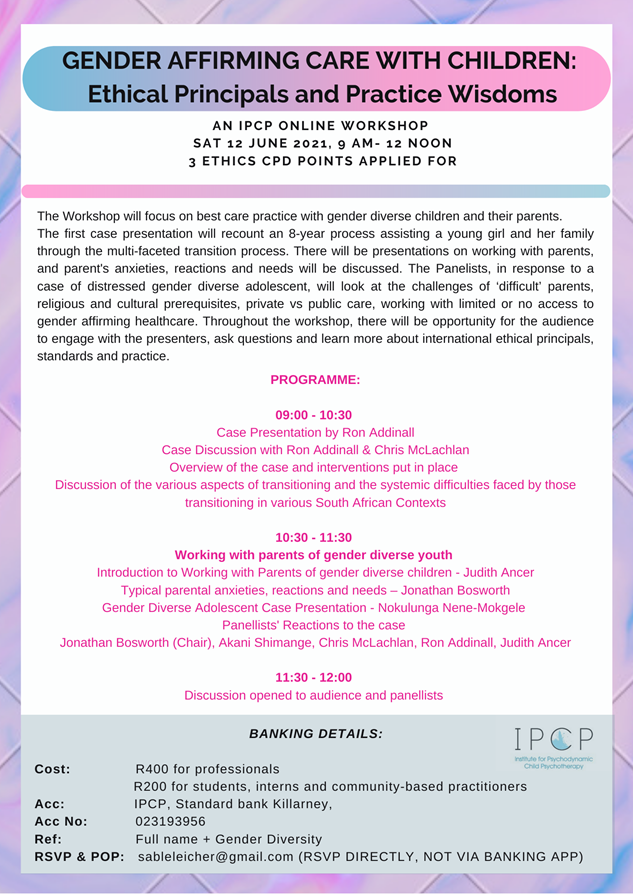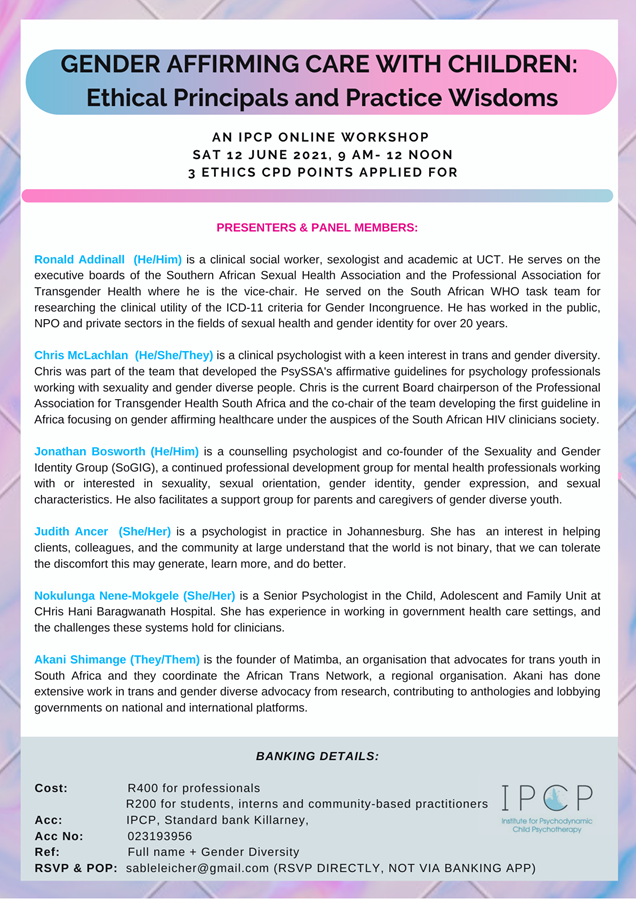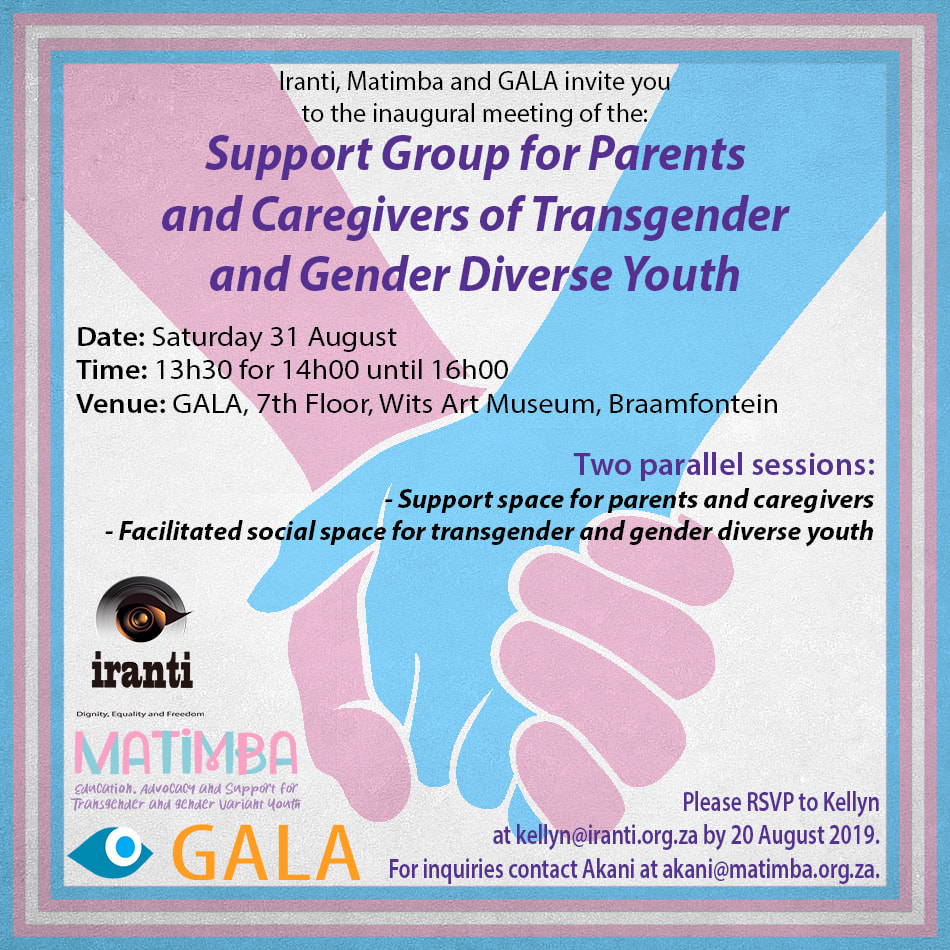|
Upcoming online workshop focussing on the ethics of working with gender diverse (gender non-conforming, transgender and non-binary) children and adolescents.
0 Comments
Iranti, Matimba, GALA, a determined parent and myself are working at creating a support space for parents and caregivers of transgender and gender diverse youth as well as a social space for the youth.
Please share the event and flyer with anyone whom may be interested.  Parenting teenagers can be very challenging but also really rewarding. Adolescence is an important developmental stage that often has a big impact on our later lives. Both parents and teenagers may approach adolescence with a mix of feelings. Keeping all of this in mind, I will regularly be writing parenting articles for parents with teenagers for All4Women.co.za. I hope that these articles empower parents to assist themselves as well as their adolescents. Links to my first two articles can be found below:  Building and maintaining a good relationship with your child's school can have various benefits, such as: - having a better understanding of your child's development - being involved in preventing educational and behavioural problems - demonstrating to your child how invested you are in them and their education - being better able to support your child - improving your child's attitude towards school and school attendance - potentially improving your child's academic performance and overall functioning; and - potentially allowing your child to go further in their education But how do you build and maintain a good relationship with your child's school? The article, Building a relationship with your child's school, provides some excellent practical advice on how to build and maintain this relationship. The article thoughtfully takes into account different parents' capacities (working or not working, amount of time available, own strengths etc.) and how to build the relationship at different levels of schooling. The article is written by the Raising Children Network, an Australian parenting website. The website is a great resource for parents, families and teachers and offers valuable information on topics across your child's development.  Parenting children at any age can be stressful and difficult for parents. Dealing with this stress often impacts on the parents relationship with each other. Adolescence is commonly experienced as one of the more difficult developmental periods to parent. It hence may be more stressful and have a greater impact on the parents relationship. However, it is not just the stress of parenting teenagers that may increase this impact but the very nature of the developmental issues that adolescents are working through. Psychologist Suzanne Phillips suggests three guiding principals (balance, communication and connection) that specifically assist with your teenager's navigation of their developmental tasks as well help strengthen your relationship with your partner. In Phillips' article (Raising Teens Without Ruining Your Marriage: Three Principles), she provides a useful overview of the difficulties underlying adolescence and how these may guide how teenagers may feel and behave. She relates these developmental challenges to the specific tasks parents of teenagers face and how they can practically address these while strengthening their own relationship. She also emphasise how rewarding and growth-promoting this period may be for you, your relationship and your adolescent: "Whatever else life offers, raising a teen will probably offer you the greatest moments of joy and the greatest moments of stress. As such it can invite problems that strain your marriage and possibilities that enhance your parenting and partnering."  Sexual orientation and gender identity are still a controversial topics in South African schools. Lesbian, gay, bisexual, transgender and intersex (LGBTI) youth, teachers and parents still face prejudice and discrimination on a daily basis. Many parents and teachers find it difficult to provide education on sexual orientation and gender identity. They may also battle to provide support for LGBTI youth. Furthermore, learners often do not have access to adequate resources on sexual orientation and gender identity. Gay and Lesbian Memory in Action (GALA) have recently launched a website providing resources for LGBTI youth, their parents, teachers and allies as well as for researchers. These free and valuable resources provide accessible overviews of sexual orientation and gender identity. They make recommendations about best practices, policy and education and empower learners, parents and teachers with the information they need. Find these highly recommended sexual orientation and gender identity resources here.  Adolescence is often seen as a turbulent time, especially from the perspective of parents. During the teenage years the individual goes through various social changes within their family, peer groups and culture as well as physically and emotionally. In the following video, Lisa Kudrow (yes, she was biology major!) interviews Abby Baird (a psychology professor at Vassar College in New York) about the teenage brain. Baird provides an interesting discussion about how the adolescent brain can be viewed as an adult brain in practice and how fluctuations in abilities such as decision making can be attributed to this practice. The discussion is aimed at the lay person but also deals with important - and often complex - neuropsycholology and may be a useful resource for parents, teacher and adolescents (among others) to better understand the biology underlying "typical" adolescent behaviour. Baird also makes some important points about applying with caution general findings to individuals (especially around gender) and how key it is for parents to understand their children's own idiosyncrasies.  Parenting can be a challenging task by itself but with constant "DOs and DON'Ts" from family members, friends, professionals and the ever increasing media parents may feel overwhelmed, pulled in multiple (often opposing) directions and find it hard to find their own unique parenting styles. In the following article psychologist Judith Ancer provides helpful suggestions on the importance of finding a balance as well as useful practical tips on how to do this: http://judithancer.wordpress.com/2012/10/20/the-good-enough-parent/ |
Jonathan's BlogI use this blog to post links to articles and videos that may relate to some of my services or interests. This content may also be useful for potential clients as well as other people interested in psychology and self development. Archives
July 2021
Categories
All
|






 RSS Feed
RSS Feed